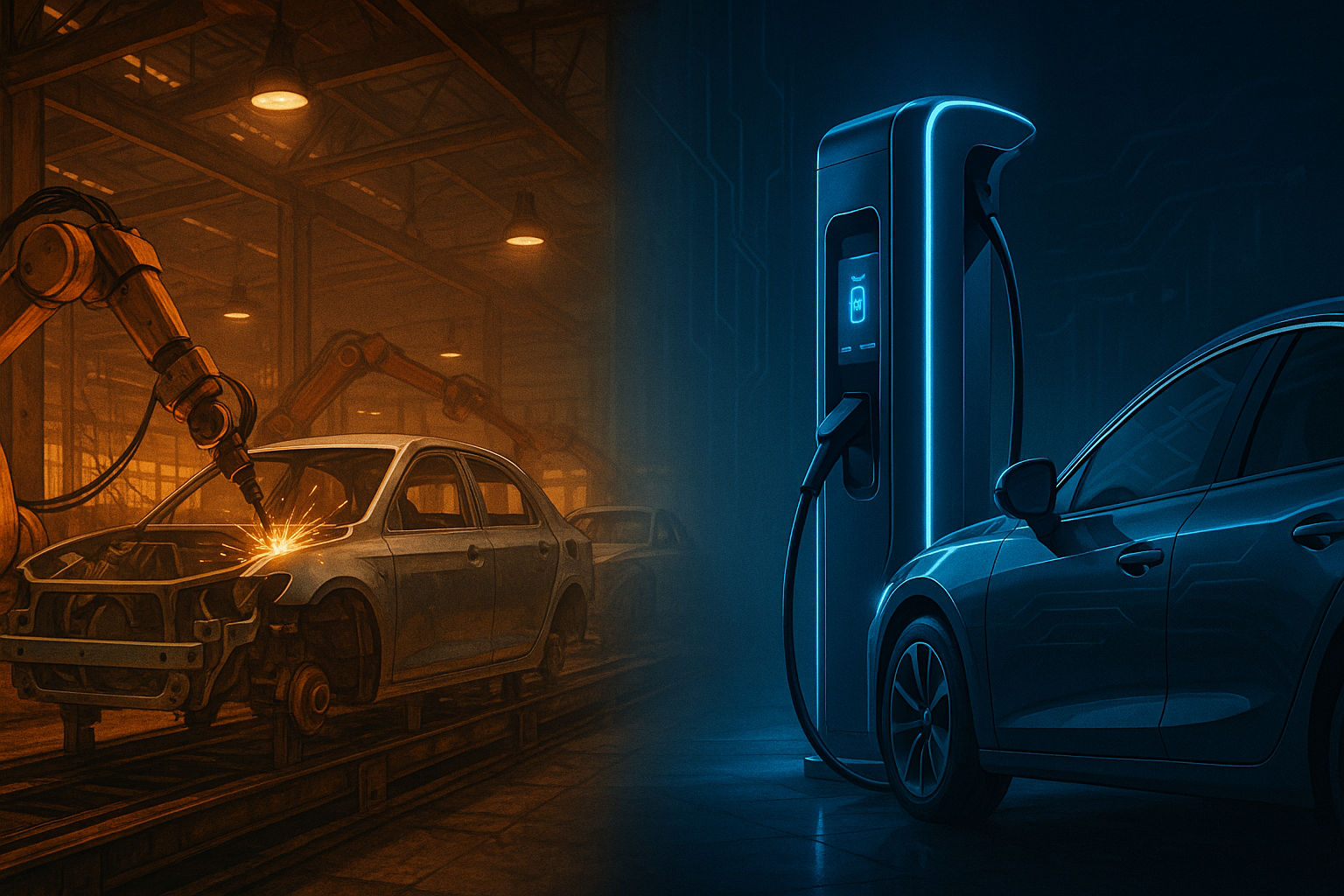The auto industry is having a midlife crisis.
It's plain as day when you look at the market: traditional carmakers are trapped in valuation purgatory, unsure whether to present themselves as old-school manufacturing businesses or cutting-edge tech disruptors. And Wall Street? Well, Wall Street can't seem to make up its mind either.
I've watched this drama unfold for years now, and it's only getting more bizarre. Ford recently did an about-face on reporting its monthly EV sales figures—numbers they couldn't stop trumpeting when the trend line pointed upward. GM continues spinning elaborate autonomous driving fantasies while its Cruise unit hemorrhages cash faster than a teenager with their first credit card.
And then there's Tesla.
Elon Musk's company still commands tech-company-like multiples that make traditional auto executives turn green with envy, despite its own stock taking a serious beating since its 2021 peak. Talk about a split personality.
What's a Car Company Worth, Anyway?
Here's the thing that keeps auto executives up at night (and I've had drinks with enough of them to know): Tesla trades at roughly 5-6 times sales, while Ford and GM hover around a measly 0.3x. That's not just a gap—it's a Grand Canyon-sized chasm.
"The market treats us like we're making horse-drawn carriages," one senior exec at a Detroit automaker told me last year, bourbon in hand. He didn't want to be named—nobody wants to publicly admit they're jealous of Tesla's valuation.
Look at the numbers. Tesla's market cap still sits around $550 billion, while Toyota—which sells far more vehicles and makes more actual money—comes in around $270 billion. Ford and GM? They're the bargain-basement options at roughly $45-50 billion each.
Let that sink in: Tesla is worth more than GM, Ford, Stellantis, and Honda... combined. With room left over for a Maserati or two.
The Multiple Personality Disorder
The heart of this madness is a simple question that nobody can answer: Are carmakers manufacturing companies or technology companies?
Traditional auto businesses certainly deserve traditional multiples—they're capital-intensive beasts that live and die by economic cycles and operate on margins thinner than the paint on your bumper. But their EV and software divisions? Those theoretically merit higher multiples since they're growth-focused and might (emphasis on might) escape manufacturing's gravitational pull.
The problem? These businesses are completely tangled up in the same corporate bodies. Ford's traditional F-150 cash cow subsidizes its electric adventures. GM's ICE profits bankroll its autonomous dreams.
I've sat through countless earnings calls where CEOs try to convince analysts they deserve Tesla-like multiples for their EV divisions while explaining away disappointing margins on those same vehicles. It's corporate contortionism at its finest.
Margins Tell a Different Story
Having covered the auto sector since before Tesla delivered its first Roadster, I've noticed something the valuation gap doesn't reflect: the margins aren't actually that different anymore.
- Tesla: ~17% gross margins (down from 25%+ during its heyday)
- GM: ~14% gross margins
- Ford: ~15% gross margins
- Toyota: ~16% gross margins
Not exactly the yawning gap you'd expect given the market cap disparity, is it?
Tesla has managed the impressive feat of maintaining relatively strong margins while growing—which partly explains its premium valuation. But even Musk's company has seen those margins compress as it's been forced to slash prices to keep moving metal. (Sorry, I meant "accelerate adoption of sustainable transport.")
The laws of automotive gravity eventually assert themselves. Cars are expensive to build, no matter what logo is on the hood.
The Scale Paradox
There's another wrinkle here that makes me scratch my head: scale advantages seem to count for nothing in today's valuations.
Toyota churns out roughly 10 million vehicles annually with efficiency that would make even German engineers nod in respect. Ford and GM each produce 6-7 million. Tesla recently crossed the 1.3 million mark.
Yet Tesla gets the premium valuation. Why? Wall Street appears to believe that traditional scale advantages—spreading fixed costs, supply chain leverage, manufacturing know-how—matter less in an EV world than software capabilities and technological edge.
Is that true? The jury's still deliberating, but investors have already rendered their verdict.
Desperate Measures
So what's a traditional automaker to do? They've tried everything short of ritualistic sacrifice to the market gods:
Ford split itself into Ford Blue (traditional) and Ford Model e (electric) businesses—though they remain under one stock ticker, which kind of defeats the purpose.
GM has staked its flag firmly in the all-electric-eventually camp, while Ford hedges its bets like a poker player with a mediocre hand.
Everyone—and I mean everyone—is suddenly talking about "software-defined vehicles" and recurring revenue streams as if they've just discovered electricity. (In a way, I suppose they have.)
And most recently, traditional automakers are slashing EV investments after getting punished for burning cash. They can't win for losing.
None of these approaches has fundamentally shifted valuations. The legacy discount sticks like gum on a hot sidewalk.
Caught Between Worlds
The reality? These companies are caught in a genuine dilemma that's almost impossible to navigate cleanly.
They need to invest billions in an electric future while keeping their profitable gas-guzzler businesses humming. They need to promise growth while delivering margins. They need to be both disruptors and incumbents simultaneously.
It's like watching your dad try to master TikTok dances while still balancing the family checkbook. Even when he gets the moves right, something just seems... off.
I remember sitting across from a veteran auto executive last winter who put it bluntly: "We're too tech-forward for value investors and too old-school for growth investors. We're homeless on Wall Street."
Maybe someday the market will recognize value in these legacy players if they successfully navigate the transition. Or perhaps Tesla will finally be valued like the car company it ultimately is. Until then, we're watching an industry trying desperately to convince investors it's driving toward the future while still very much tethered to the economics of the past.
And that's one hell of a tough sell—especially when you're competing with companies that never had to make that transition in the first place.




